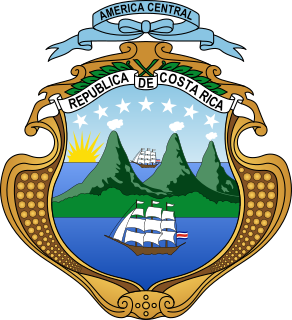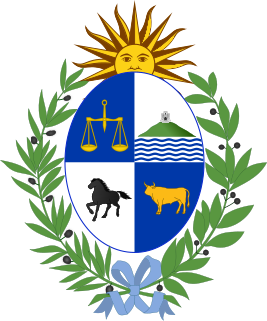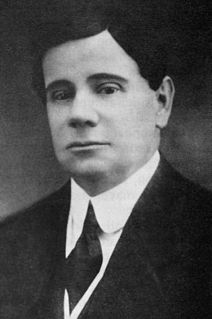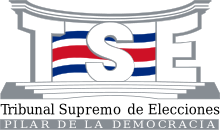
Politics of Cape Verde takes place in a framework of a semi-presidential representative democratic republic, whereby the Prime Minister of Cape Verde is the head of government and the President of the Republic of Cape Verde is the head of state, and of a multi-party system. Executive power is exercised by the President and the Government. Legislative power is vested in both the Government and the National Assembly. The Judiciary is independent of the executive and the legislature. The constitution first approved in 1980 and substantially revised in 1992 forms the basis of government organization. It declares that the government is the "organ that defines, leads, and executes the general internal and external policy of the country" and is responsible to the National Assembly.

The politics of Costa Rica take place in a framework of a presidential, representative democratic republic, with a multi-party system. Executive power is exercised by the president and their cabinet, and the President of Costa Rica is both the head of state and head of government. Legislative power is vested in the Legislative Assembly. The president and 57 Legislative Assembly deputies are elected for four-year terms. The judiciary operates independent of the executive and the legislature but remains involved in the political process. Costa Rica is a republic with a strong system of constitutional checks and balances. Voting is compulsory in Costa Rica but it is not enforced.

A senate is a deliberative assembly, often the upper house or chamber of a bicameral legislature. The name comes from the ancient Roman Senate, so-called as an assembly of the senior and therefore considered wiser and more experienced members of the society or ruling class.

The President of the Republic of Costa Rica is the head of state and head of government of Costa Rica. The president is currently elected in direct elections for a period of four years, which is not immediately renewable. Two vice presidents are elected in the same ticket with the president. The president appoints the Council of Ministers. Due to the abolition of the military of Costa Rica in 1948, the president is not a commander-in-chief, unlike the norm in most other countries, although the Constitution does describe him as commander-in-chief of the civil defense public forces.

Lesbian, gay, bisexual, and transgender (LGBT) rights in Costa Rica have evolved significantly in the past decades. Same-sex sexual relations have been legal since 1971. Since 2013, households headed by a same-sex couples can obtain some domestic partnership benefits. In January 2018, the Inter-American Court of Human Rights made mandatory the approbation of same-sex marriage, adoption for same-sex couples and the recognition of transgender people's gender identity on ID cards. The Government had announced that it would apply the rulings in the following months.
An election commission is a body charged with overseeing the implementation of electioneering process of any country. The formal names of election commissions vary from jurisdiction to jurisdiction, and may be styled an electoral commission, a central or state election commission, an election board, an electoral council or an electoral court. Election commissions can be independent, mixed, judicial or executive. They may also be responsible for electoral boundary delimitation. In federations there may be a separate body for each subnational government. The election commission has a duty to perform election related activities in an orderly manner. For election related problems, Election Commission is responsible.
Same-sex marriage in Costa Rica has been legal since May 26, 2020 as a result of a ruling by the Supreme Court of Justice. Costa Rica was the first country in Central America to recognize and perform same-sex marriages.

Christianity is the largest religion in Costa Rica, with Roman Catholics having the most adherents. Roman Catholicism is the state religion, but the government generally upholds people's religious freedom in practice.
Ezequiel Gutiérrez Iglesias was a Costa Rican politician.

The Supreme Court of Costa Rica is the court of greater hierarchy of Law and Justice in Costa Rica.

The Judiciary of Brazil is the group of public entities designated by the Brazilian constitution to carry out the country's judicial functions. It consists of five entities, namely: the Supreme Federal Court (STF); the Superior Court of Justice (STJ); federal regional courts; military courts; and the courts of states, the federal district, and territories. The STF and the superior courts - the Superior Labor Court (TST), the Superior Electoral Court (TSE), and the Superior Military Court (STM) - are based in Brasilia, Brazil's capital, and have jurisdiction throughout Brazil. Eleven justices sit on the Supreme Federal Court, whose primary function is to uphold the constitution. The STJ consists of at least 33 justices.

General elections were held in Costa Rica on 3 February 2002. For the first time in the country's history, no candidate in the presidential election passed the 40% threshold. This meant a second round of voting had to be held on 7 April which saw Abel Pacheco of the Social Christian Unity Party defeat the National Liberation Party's Rolando Araya Monge.

The judiciary of Uruguay is a branch of the government of Uruguay that interprets and applies the laws of Uruguay, to ensure equal justice under law, and to provide a mechanism for dispute resolution. The legal system of Uruguay is a civil law system, with public law based on the 1967 Constitution, amended in 1989, 1994, 1997, and 2004. The Constitution declares Uruguay to be a democratic republic, and separates the government into three equal branches, executive, legislative and judicial. Private relationships are subject to the Uruguayan Civil Code, originally published in 1868. The Constitution defines the judiciary as a hierarchical system courts, with the highest court being a five-member Supreme Court, who are appointed by the legislative branch of the government, for ten-year terms. The Supreme Court appoints the judges of most of the lower courts. Below the Supreme Court, there are sixteen courts of appeal, each of which has three judges. Seven of the courts of appeal specialize in civil matters, four specialize in criminal matters, three cover labour law, and two focus on family matters. At the lowest tier are justices of the peace and courts of first instance specialized in administrative, civil, criminal, customs, juvenile, and labour cases. Although the hierarchy, all of them are functionally and structurally impartial, that is, the tribunal should not be interested in the object of the particular case, and the higher tribunal does not impose a behaviour nor precedent to the lower ones. There are also separate courts for auditing, elections and the military.

The Constitution of Costa Rica is the supreme law of Costa Rica. At the end of the 1948 Costa Rican Civil War, José Figueres Ferrer oversaw the Costa Rican Constitutional Assembly, which drafted the document. It was approved on 1949 November 7. Several older constitutions had been in effect starting from 1812, with the most recent former constitution ratified in 1871. The Costa Rican Constitution is remarkable in that in its Article 12 abolished the Costa Rican military, making it the second nation after Japan to do so by law. Another unusual clause is an amendment asserting the right to live in a healthy natural environment.

Municipal elections were held in Costa Rica on 5 December 2010. Were the third municipal elections in the history of the country and the last on be held in December of the same electoral year due to an electoral reform that turned municipal election to be held mid-term. Because of this the Electoral Supreme Court mandate the constitutional period of the newly elected authorities to last for 6 years for one unique time. The election was for mayors of the 81 cantons, syndics and district councilors for all the country's districts and 8 Intendants for 8 especial autonomous districts.

The Free State of Costa Rica was the name acquired by Costa Rica after its split from the Federal Republic of Central America in 1838 and until the proclamation of the First Costa Rican Republic in 1847.

The history of the Costa Rican legislature is long and starts from even before its formal independence from the Spanish Empire. Costa Rica is one of the world's oldest democracies, thus, its parliamentary history dates back several centuries.

The Political Constitution of Costa Rica of 1917 was a constitution that was in force for two years; from 1917 to 1919. It was promulgated by then dictator Federico Tinoco Granados after the coup d'état that overthrew Alfredo González Flores in 1917. It was drafted by the ex-presidents Bernardo Soto Alfaro, Rafael Iglesias Castro, Ascensión Esquivel Ibarra, Cleto González Víquez and Carlos Durán Cartín. The presidents José Joaquín Rodríguez Zeledón and Ricardo Jiménez Oreamuno were invited to participate in the process as others of their status, but they refused to do so with various excuses.

The Founding Junta of the Second Republic was a de facto government which existed in the Republic of Costa Rica from May 8, 1948 to November 8, 1949, with the overthrow of the constitutional president Teodoro Picado Michalski, by a group Of the revolutionaries headed by José Figueres Ferrer.

The Supreme Electoral Court is the highest electoral authority in the country of El Salvador.













